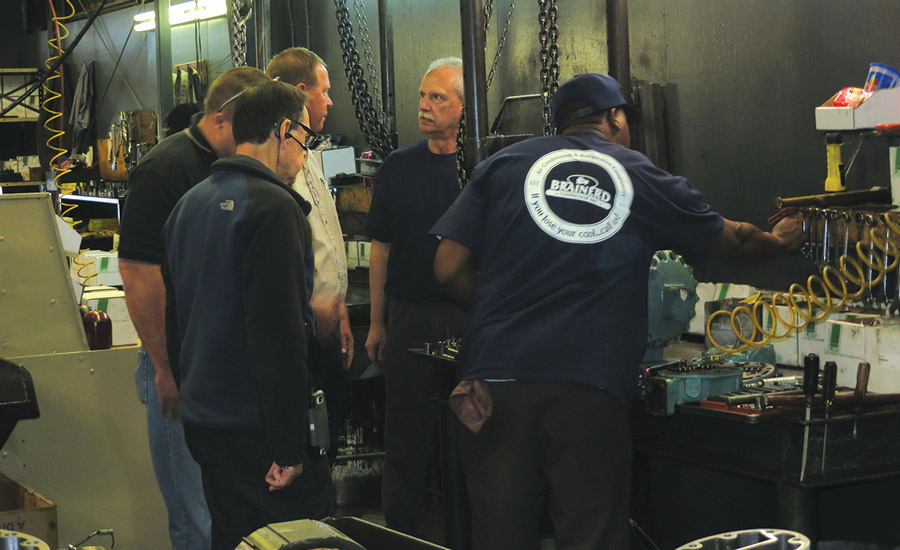A common complaint throughout the HVACR industry is that when new technicians enter the industry, they don’t have the skills and knowledge that employers expect. One area where this is evident is in the field of compressor service.
KNOWLEDGE GAP
Richard Staiano, president of National Compressor Exchange Inc. in Ridgewood, New York, said his company frequently has to deal with issues stemming from inexperienced technicians.
“For the majority of technicians, training is not at the level it should be for the work they have to perform,” Staiano said. As a remanufacturer, Staiano said his company’s technical assistance is through the roof because he and his employees have to answer too many basic questions from service technicians.
“There are times when somebody will call and ask a question that’s so Service 101, and, meanwhile, they’re putting in a 50- or 30-ton compressor,” Staiano said. “That’s the problem in the industry, and I think a lot of service managers and owners can relate to that.”
Sonny Cappabianco, president and owner of Motors and Compressors Inc. in Orlando, Florida, also sees the results of inexperienced, uneducated technicians every day. Too often, Cappabianco said, technicians are lacking in the knowledge and experience needed to determine what caused a compressor to fail. In other words, they’re scared to open up a compressor, he said.
The solution to this problem is simply better education and training. But, it’s certainly not simple to implement. Whit Perry, a long-time HVAC instructor, said that if he had the answer for how to fix what he terms the broken aspects of industry education and training, he’d be a multimillionaire. Perry served as lead instructor for 12 years at Northwest Mississippi Community College in Senatobia, Mississippi, and currently teaches part-time at the William R. Moore School of Technology in Memphis, Tennessee.
He also spends time in the field performing service jobs, which he enjoys doing to help out around his city. In the field, Perry continues to see the downward spiral often caused by uneducated technicians.
“Some of the jobs you go see, you wonder, ‘How in the world did they do this?’” he said. “Compressor manufacturers, like Brainerd, Copeland, and Tecumseh, make good products that are very resilient. But you see some of the stuff these guys have put in and wonder how it ever lasted as long as it did.”
EDUCATIONAL OPPORTUNITIES
As an instructor, Perry said he is always trying to expand the educational opportunities available to his students. And, while the knowledge gap may be wide, there are ample opportunities and avenues to gain more education on compressors. Manufacturers, distributors, and industry associations all offer advanced compressor training. Additionally, many remanufacturers open their doors to people interested in learning more about their products and processes.
According to Barry Hodge, sales manager for Brainerd Compressor Inc. in Memphis, Tennessee, the first step for technicians is to “use as much information as they can find in the classroom, books, or from the Internet to become an accomplished technician.”
He continued, “Besides getting degrees in technical schools and classes, we encourage them to take advantage of different websites and organizations, such as RSES, ACCA, ASHRAE, and Mechanical Service Contractors of America (MSCA), to enhance their training on systems to be able to prevent failures from occurring.”
Hodge added that Brainerd invites classes from local technical schools to tour its facilities.
“We encourage young students to carefully consider the classes and education necessary to succeed in the air conditioning and refrigeration fields,” he explained.
Perry takes his classes to Brainerd’s facility every year and said the company has always welcomed his students.
“They bring them through, show them the operation, and try to educate them. They even open up at night to help me [so the night-class students can visit],” Perry said.
Students are eligible for extra credit in Perry’s classes when they attend additional training courses, such as distributor- or manufacturer-sponsored classes.
“I try to make it worth their while so they go to every class possible. That’s what I did — coming into the field at [age] 36, I didn’t have time to play around. I always tell my guys, if you go to a class and spend four hours and learn one thing, you’ve got your money’s worth,” Perry said.
Cappabianco has taught classes for companies in his area with a focus on training technicians who are installing compressors. He said his approach is very hands-on.
“I push people to open up compressors in class,” he said. “I start by showing the OEM films, and we do teardowns of compressors so they can see the result themselves and learn what to look for.”
He added, “Eighty-five percent of the time you blame the motor when it’s usually something else. Before you replace a compressor, open it up and find out what really caused it to fail.”
Summing it up, Cappabianco said, “For those of us who are in this [working regularly with compressors], whether it’s the factory or independent remanufacturers, we run into these problems every day, and the only way we can hope to start controlling this is by educating our service techs out there and having good procedures for them to follow.”
Publication date: 3/28/2016
Want more HVAC industry news and information? Join The NEWS on Facebook, Twitter, and LinkedIn today!



Report Abusive Comment